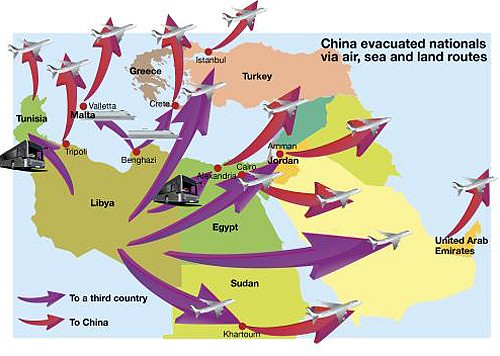|
 |
|
MULTI-PRONGED OPERATION: A Chinese Air Force cargo plane transfers 250 Chinese evacuees from Libya to Sudan's Khartoum on March 2 (XINHUA) |
Significance
Analysts pointed out that the operation was not only a big success for China's evacuation mechanism, but also a big success for China's diplomacy.
Dong Manyuan, Director of the Department for International Strategic Studies at the CIIS, said the evacuation showed China now has more resources and means to protect the safety of its nationals overseas. It also marked a new phase in China's efforts to protect its nationals' interests and deal with emergencies overseas.
The Hong Kong-based newspaper Ta Kung Pao said a country's ability to protect its citizens overseas reflects its national strength and influence in the world. The evacuation also highlighted China's people-first diplomacy.
With the development of China's economy and international cooperation, more and more Chinese companies have established an overseas presence. The successful evacuation proved the Chinese Government's firm support for the companies' efforts to reach out to the global market, said Xia Liping, a professor at the China Foreign Affairs University.
Unlike releasing early warning information or opening consular protection hotlines, evacuation is the last step when facing emergencies and unexpected incidents, said Li Wei, Director of the Institute of Security and Strategic Studies at the CICIR. He noted strengthening consular protection and protecting the interests of overseas nationals are new aspects of China's diplomacy.
China's consular protection mechanism has become mature after being tested by tough tasks, said Huang Ping, Director General of the Foreign Ministry's Department of Consular Affairs. Over the past five years, the Chinese Government has evacuated a large number of Chinese citizens overseas during a number of similar events.
The Department of Consular Affairs set up a division for consular protection in May 2006. In August 2007, it upgraded the division to the Center for Consular Assistance and Protection. The center is responsible for providing consular protection and assistance for overseas Chinese while issuing early warnings and relevant information.
As early as 2004, China's State Council established a ministerial-level joint conference system for the protection of Chinese citizens and agencies abroad. Chinese diplomatic missions abroad have also established emergency response plans. These initiatives enable various ministries and departments cooperate with each other.
For example, the Ministry of Foreign Affairs, the State-owned Assets Supervision and Administration Commission of the State Council, the Ministry of Transport, the Ministry of Commerce, CAAC and relevant military departments jointly achieved great results by concentrating all possible means of transportation to get the evacuees out of Libya and return them to China.
In addition, many evacuees lost their valid IDs in riots, but coordination among the Ministry of Foreign Affairs, the Ministry of Public Security and the General Administration of Customs helped them by simplifying entry procedures.
Tang Zhichao, Deputy Director of the Institute of Asian and African Studies at the CICIR, said the evacuation showed the quick response, high efficiency and orderly coordination of the Chinese Government.
Tang of the CICIR noted that many countries, especially Greece, Tunisia, Egypt, Malta, Turkey and Jordan, offered China great help during the evacuation, reflecting China's good relationships with them. This also proved the success of China's independent foreign policy of peace, which the country should unswervingly pursue.
On February 27, on behalf of the Chinese Government and its people, Premier Wen sent messages of gratitude to the Greek and Maltese governments for their support and help in evacuating Chinese nationals from Libya. On March 1, Foreign Minister Yang Jiechi called his counterparts in Jordan, Turkey, Sudan and the United Arab Emirates to express his appreciation for their assistance and support during the evacuation.
Chinese companies in Libya also hired hundreds of employees from Viet Nam, the Philippines, Nepal and Bangladesh. China helped evacuate these foreign employees as well for humanitarian reasons.
As of March 2, China had evacuated about 2,100 citizens for 12 foreign countries.
Guo Shaochun, Deputy Director General of the Foreign Ministry's Department of Consular Affairs, said, "In any circumstances, they will not be left alone. This is our promise to them."
 | 